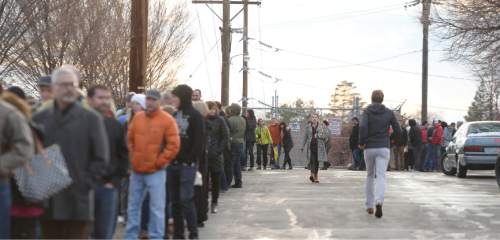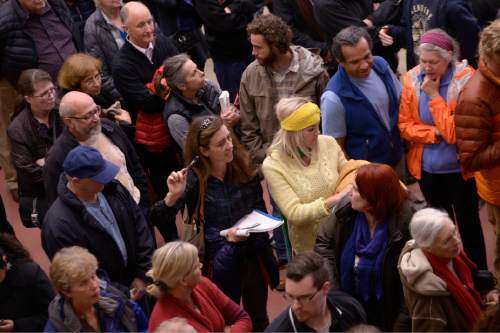This is an archived article that was published on sltrib.com in 2016, and information in the article may be outdated. It is provided only for personal research purposes and may not be reprinted.
Gov. Gary Herbert said Thursday that the system used to select presidential nominees should be changed from the current scattershot primaries and caucuses to one of four regional primaries with each part of the country taking turns going first in the process.
"I think the system needs fixing," Herbert said during his monthly KUED news conference. "The system is not delivering."
Herbert said the rotating regional primary scheme, which he has advocated since he was lieutenant governor, would save money and ensure that each region has its unique issues addressed by candidates.
The governor said he even made a pitch for the primaries in a recent meeting with President Barack Obama.
"He was intrigued, as most people are," Herbert said, "and we all say to ourselves, 'Is this the best system? Does it deliver the best candidate? And, if not, what can we do to improve it?'"
The National Association of Secretaries of State, the organization of state elections officers, has been pushing for the rotating primary scheme since 2000 as a way to stave off front-loading — where states try to leapfrog in front of one another to be more relevant in the process.
Barring a regional primary, Herbert said he would like to see Utah hold its nominating event at the beginning of the presidential campaign — "Earlier is better than later" — but there are restrictions placed on states by the national parties that limit how early states can schedule their primaries.
While an estimated 80,000 Democrats attended their caucuses Tuesday and more than 200,000 Republicans either attended in person or voted online, the numbers participating still didn't measure up to 2012 or 2008, when Utah held presidential primaries.
Herbert said he favors a primary over a caucus and included $3 million in his budget proposal for Utah to hold a primary this year, but "the parties didn't want to do that so it didn't happen."
In fact, Democrats did want the state to organize the primary, according to Utah Democratic Party Chairman Peter Corroon, but Republicans wanted a caucus and the Legislature went along with the GOP's wishes. Republicans hold 87 legislative seat to Democrats' 17.
On Thursday, Corroon sent an email bemoaning the fact that long lines at caucuses drove away some Democrats and essentially disenfranchised voters. He asked Democrats to share their experiences so he and the party could make the case to the Legislature and state elections officials that, in the future, the state should run primary elections.
Herbert also explained that he endorsed Texas Sen. Ted Cruz because Gov. John Kasich can't beat front-runner Donald Trump.
"Governor Kasich is a good friend and has been a good governor and has got a good track record," Herbert said. "The unfortunate truth is the numbers are starting to show that Governor Kasich didn't have a good opportunity [to win]. Senator Cruz has the best opportunity, we're starting to coalesce around him, and I think he would be a better candidate, a better president than Donald Trump."
Herbert said that it has been a "strange election year" on the Republican side of the presidential contest.
"Whatever the rules have been in the past seem to have been thrown out this year," Herbert said. "I'm a little concerned about the lack of decorum."
He said he anticipates that Trump will fall short of the 1,237 delegates needed to win the party's nomination and the GOP is headed toward an open convention in Cleveland in July.
If Herbert is a delegate, he said, he is bound to support Cruz on the first ballot. After that, he said, "We'll see what discussions occur."
Closer to home, Herbert said his re-election campaign is focusing its efforts on courting the 4,000 state delegates that were also chosen at the GOP caucuses Tuesday, but he anticipates there will be debates between himself and his Republican challengers.
So far, former Overstock CEO Jonathan Johnson has repeatedly hit Herbert for refusing debates. Two other candidates — software developer Nate Jensen, and Carlos Tavares Jr. — have also filed to challenge Herbert on the Republican side.
Twitter: @RobertGehrke





